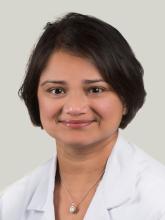Hepatologist finds purpose as health equity advocate for LGBTQI+
Sonali Paul, MD, once thought she was an anomaly in the world of medicine. “As I was going through training, I didn’t think others like me existed, a gay South Asian transplant hepatologist. I certainly didn’t have mentors that looked like me. I didn’t have anyone to look up to,” she said.
Fighting to promote health care equity in the LGBTQI+ population has been a cornerstone of her career. As cofounder and an executive board member of Rainbows in Gastro, a sexual and gender minorities affinity group that builds community among LGBTQI+ medical trainees and physicians in gastroenterology, Dr. Paul often goes into the community to promote open discussions about health equity in sexual and gender minority populations.
“Our mission is CHARM: community, healing, advocacy, research, and mentorship,” said Dr. Paul, a transplant hepatologist with the University of Chicago Medicine with a specific niche within fatty liver disease and obesity medicine. She serves as an associate program director for the Internal Medicine Residency Program specifically for diversity, equity, and inclusion.
In 2022 she received the University of Chicago’s Department of Medicine Diversity Award.
Rainbows in Gastro has shown trainees they can be open about their sexual orientation and gender identity without fear of retribution. “I’ve had medical students and residents come to me and say they were going to go into endocrine or some other field because they thought it was more gay friendly, until they saw our group and the work we’re doing,” Dr. Paul said.
In an interview, she talks more about her two key passions: reducing disparities and promoting health equity.
Q: You presented “Embrace the Rainbow: Creating Inclusive LGBTQ+ Spaces in Medicine” at the University of Chicago Medicine Grand Rounds. What were some of the key takeaways of that presentation?
Dr. Paul: One is education. Knowing the history of the LGBT community and how marginalization and discrimination affects the individual coming into that clinic is important. Having little things like pronoun badges or a rainbow flag, having nondiscrimination policies that include sexual orientation, gender identity that are displayed in the clinics, are very small things that seem almost trivial to some people. But I can tell you for myself, it matters if I walk into a door and there’s a rainbow flag there. I feel immediately safer.
Q: What are your hopes and aspirations for the field of GI moving forward?
Dr. Paul: I didn’t learn about social determinants of health in medical school, but more and more I think we’re starting to pivot and really look at those things. I hope GI and hepatology continues to do that.
For me, it’s looking at everything through a health disparities lens, seeing the health disparities across communities and finding solutions to mitigate them. How do we get people access to transplant for all our patients, and really examining the social determinants of health in the health care we provide?







